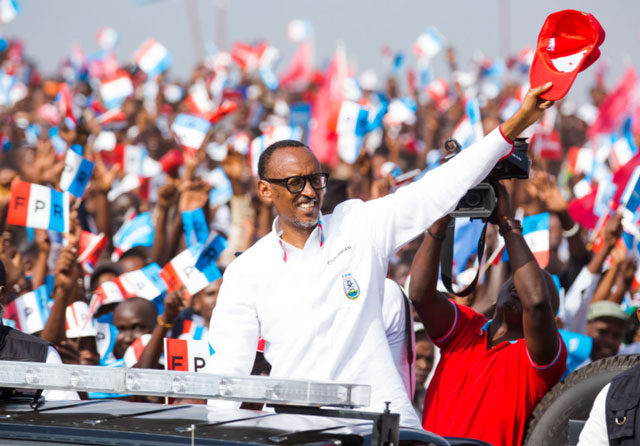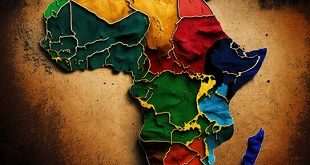
How Rwandans reacted to the west’s war against the symbol of their nation’s success
Rwanda |Andrew M. Mwenda| Last week, Paul Kagame won presidential elections in Rwanda by 98.6%. Historically, such margins have only been won in countries like Saddam Hussein’s Iraq, which was under the tight grip of a tyrant. To many observers armed with this experience, the election in Rwanda and Kagame’s margin of victory does not have to be analyzed in its specificity. It is only explained by citing the experience of other nations. Therefore, to many commentators, Kagame’s margin of victory does not reflect anything unique and specific to his country. Instead it only confirms the prejudice that Rwanda today is the same as Sadam’s Iraq.
But this approach of analysing Rwanda through the experience of others ignores and/or denies the country’s history and its social and political context. Anywhere else, such analysis would be rejected out of hand as pedestrian. But because Rwanda is a poor African country, academics and editors in the rich nations of Western Europe and North America (supported by a section of African elites) don’t really care about the quality of the analysis. So anything that feeds preexisting biases and prejudices about Africa (and Rwanda specifically) finds minds ready to swallow it.
Yet Rwanda is actually not the first country to have a president elected democratically by such a huge margin. In 1961, the departing British colonial administration organised an election in which the Tanzania African National Union (TANU) led by Julius Nyerere won 70 of the 71 seats in parliament, the other seat was won by a TANU member who ran against his own party’s official candidate. In 1962, Tanganyika held a presidential election in which Nyerere won by 99.2% against Zuberi Mtemvu of the African National Congress who got only 0.8% of the vote.
Even in recent years in the Western world such unusual upsets have happened. On May 5, 2002, President Jacques Chirac of France defeated his opponent, Jean-Marie Le Pen, by 82.2% to 17.8% of the vote. It is rare in Western democracies for a candidate to win with such a margin. Yet no analyst relied on the experience of Sadam’s Iraq to arrive at the conclusion about Chirac. Instead commentators relied on the specific circumstances in France to explain such an unprecedented majority.
This same happened in the U.S. election of 1984. That nation’s presidential elections are based on electoral colleges. In that election, incumbent president Ronald Reagan got 525 Electoral College votes against his Democratic rival, Walter Mondale’s, 13 votes i.e. got 97.6% against 2.4% – it was unprecedented. No one claimed Reagan had rigged the vote or the U.S. system had become Saddam’s Iraq. The specific circumstances that had made this seeming impossibility possible were dissected, analysed, and explained. In the 1820 election, James Monroe won 231 Electoral College votes (99.9%) against John Quincy Adams, who got only one vote. Should we, therefore, conclude from this that in that year America was under the tight grip of a tyrant?
Therefore, any analysis of Rwanda’s 2017 election must begin with the specific context of Rwanda. And if anyone is to arrive at the conclusion that Kagame’s margin of victory proves that Rwanda today is akin of Sadam’s Iraq, that conclusion should be drawn from the facts obtaining in Rwanda, not simply by analogies to another country. This article is an attempt to present that specific Rwandan experience, or at least a slice of it, to explain the outcome.
Local effort v western mimicry
The 2017 presidential election in Rwanda has been a contest between local creative effort to manage a complex post genocide situation and attempts by Western human rights groups and media to force the country to mimic the West. This contest between local creativity and an enforced mimicry was not a choice Rwandans made but one that was imposed upon them by those who think the country should follow a path decided for it from Washington, London, and Paris. The result has been a nationwide revolt against foreign pressure that forced nearly all political parties and citizens around the candidature of Paul Kagame.
Rwanda is going through a process of social change that no country has gone through in contemporary human history. It is a country where only 23 years ago, its people turned on each other with a vengeance unknown to man before. The genocide in Rwanda is unique in the annals of human history because, although it was organised by the state, it was ordinary citizens who actually carried it out. Husbands killed their wives, mothers killed their children, and friend killed friend and neighbour turned against neighbour in horror killings almost impossible to comprehend. The result was not just destruction of physical property but of the soul of its people.
In their hour of national disaster, the world abandoned Rwandans to their fate. It was a tragic failure of the international community but equally the greatest gift to that country. For then, Rwandans rose to the occasion and ended the genocide on their own. This gave them confidence to shape their destiny on their own terms. But the genocide also demonstrated the danger Rwanda faces: that although Rwandans share a common history, language, culture and religion (it is over 90% Roman Catholic), their country is a tinderbox waiting to explode. Hence nothing can be taken for granted.
It seemed impossible to reconstitute Rwandan society and get people who had killed each other to live together again. Yet through an expression of unbelievable human forgiveness, Rwandans are making strenuous efforts to put the past behind them and build a new future for their country with the milk of human kindness. At the heart of reconstructing post genocide Rwanda has been Kagame. His efforts to reconcile individuals, families and groups that had killed each other make Nelson Mandela’s reconciliation efforts in South Africa look like a walk in the park.
I know Mandela has been lionised in the world imagination and rightly so. However, his efforts pale in significance when put side by side with what Kagame has done in Rwanda. One finds in president’s office a deputy chief of staff to the president whose mother is on life imprisonment for genocide. Then in the First Lady’s office, her executive secretary is a daughter of the president of Rwanda during the genocide. In cabinet, ministers whose families were exterminated sit with ministers who have been accused of killing them. It is an experiment almost impossible to comprehend.
It is this context that Rwandans have come to look at Kagame as a symbol of their miraculous recovery from social disintegration to a stable, integrated society where killer and victim live side by side in the same villages, sit in the same parliament and cabinet, some even sharing homes and a few have inter-married. It is very difficult for outsiders to appreciate what this miracle means for Rwandans.
For many citizens of this country, the success is so precious they do not want any change in the current status quo. This is most especially when it comes to the man who more than anyone else represents this miracle. For many ordinary Rwandans, the mention that Kagame is going to retire ignites a resistance I have not witnessed anywhere in my entire life. Even he has to speak of his retirement in measured tones because people simply do not want to hear it.
Reacting to outside enemy
Contrary to the belief that Kagame wants to cling to power, the Rwandan president today finds himself a hostage of his success. Each time he has tried to explain his concept of change, he has ignited anxiety and met resistance. Rwandans get agitated because they are unsure what change can bring. In his acceptance speech this July, he made this point very clear – that there is need to work towards a transition from him to another leader. He did not attract any applause but instead dampened the mood.
The anxiety the majority of Rwandans feel about Kagame’s retirement is understandable. In politics, as in the military, there is the concept called “the margin or error.” It refers to the space a country or polity has to make mistakes. When a small mistake can lead to catastrophic consequences, a country, or a people become hypersensitive. Having lived through it, Rwandans know all too well the dangers adversarial political competition can bring to a country. They know where their country has come from. They can see where it is going. They do not want to go back to that past. And they are very optimistic about their future. They also know which persons and factors have made their current progress possible. These facts have shaped how they react to their reality.
Thus in 2015, there was a massive movement in the country to change the constitution and remove term limits so that Kagame can run again. Term limits had been put in the constitution out of the desire to uphold some governance ideal borrowed from the innovation in other countries. But it did not reflect the actual desires of the Rwandan people. That is why when it came to respect them, the population revolted. Ironically, the man most accused of masterminding lifting term limits, Kagame, was resolutely against it. He was literally forced to accept to run again.
In fact, it was Kagame’s personal belief in term limits (and in popular deference to him) that the constitutional amendment did not abolish term limits. Instead, they only postponed his exit but retained the term limits. Otherwise the vast majority of Rwandans, ordinary people and as well as elites, think term limits are too much ado over nothing. However, while Rwandans want their president to stay, international (actually read Western) groups and media have been drumming up opposition to it.
In their advocacy, media reports and commentaries, these groups totally ignore the facts on the ground in Rwanda and the feelings of its citizens. Instead, they use the experience of other countries where removal of term limits has led to popular protest to explain the Rwandan situation. Yet there has not been a single demonstration against lifting term limits to allow Kagame to run again. On the contrary there has been widespread popular support for it. Over 70% of registered voters in Rwanda signed a petition to parliament to force the lifting of term limits.
 The Independent Uganda: You get the Truth we Pay the Price
The Independent Uganda: You get the Truth we Pay the Price



